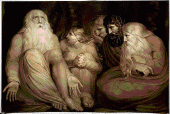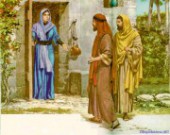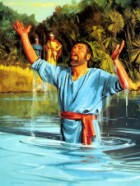Yitro
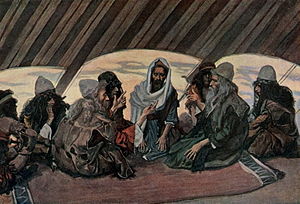
Yitro, Moses’ father-in-law, was a gentile believer in God. Yitro is particularly significant because the most important Torah portion is named after him. He is also the first human being to utter a benediction to God for the wonders performed by Him for the Israelites.
"Now Yitro, the priest of Midian, Moses' father-in-law, heard of all that God had done for Moses, and for Israel His people, how the LORD had brought Israel out of Egypt. And Yitro said: 'Praised be the LORD who has saved you from the hand of Egypt and from the hand of Pharaoh. Now I know that God is greater than all deities'." (Exodus 18:1-11).
Rabbi Pappias reads the above extract as a reproach to the Israelites, for not one of the 600,000 Israelites rose to bless God until Yitro did. (Only Moses and Yitro ever used the term, “Baruch HaShem.”) Yitro knew that God was greater than all the gods, because he had previously worshiped all the idols of the world.
Yitro is also the man who instructed Moses in the art of delegation and administering justice. “Seek out from among the people capable, God-fearing men...You must then appoint them as leaders of thousands, leaders of hundreds, leaders of fifties..." (Exodus 18:17-22).
Yitro’s help is in sharp contrast to the hatred of the Amalekites, who feature in the previous Torah portion.
Yitro's blessings are the basis for Psalm 117 where the nations are commanded to praise God along with Israelites.
The fact that the revelation at Sinai is included in a portion named after a gentile demonstrates the universality of the Torah and Israel’s commission to be a light unto the nations.
According to the Talmud, Yitro dissuaded Pharaoh from carrying out a war of extermination against the Israelites.
Yitro is revered as a prophet in the Druze religion. The Tiberias tomb of Yitro is the most important religious site for the Druze community. A few years ago, the spiritual leader of the Druze community in Israel signed a declaration calling on non-Jews in Israel to observe the Seven Noahide Commandments.
The Sefer ha-Chinuch states there are 3 positive and 14 negative commandments in the Yitro portion:
To know there is a God (Exodus 20:2.)
Not to believe in divinity besides God (Exodus 20:3.)
Not to make an idol for yourself (Exodus 20:4.)
Not to worship idols in the manner they are worshiped (Exodus 20:5.)
Not to worship idols in the four ways we worship God (Exodus 20:5.)
Not to take God's Name in vain (Exodus 20:7.)
To sanctify the Sabbath with Kiddush and Havdalah (Exodus 20:8.)
Not to do prohibited labor on the Sabbath (Exodus 20:10.)
To respect your father and mother (Exodus 20:11.)
Not to murder (Exodus 20:13.)
Not to commit adultery (Exodus 20:13.)
Not to kidnap (Exodus 20:13.)
Not to testify falsely (Exodus 20:13.)
Not to covet another's possession (Exodus 20:14.)
Not to make human forms even for decorative purposes (Exodus 20:20.)
Not to build the altar with hewn stones (Exodus 20:23.)
Not to climb steps to the altar (Exodus 20:26.)
The Kenites
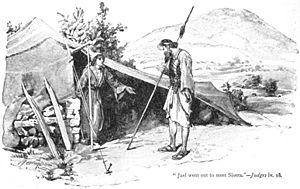
Yitro was the priestly leader of the Kenites, a nomadic clan of coppersmiths and metalworkers who had lived in or around Canaan since the days of Abraham (Genesis 15:18-21). At the Exodus, Yitro and his clan inhabited the vicinity of Mount Sinai (Exodus 3:1). Certain groups of Kenites settled among the Israelites, including the descendants of Yitro. Others maintained their nomadic lifestyle for some time.
According to the widely-regarded Kenite hypothesis, YHWH was originally the tribal god of the Kenites, borrowed and adapted by Moses. Exodus 28:12 may even describe an initiation of Moses and Aaron by Yitro into the worship of YHWH. There is a close family connection between the Israelites and the Kenites as evidenced by the fact that Moses marries a Midianite woman. Yitro also tutors Moses in the art of good governance and they both sacrifice to YHWH.
One of the most prominent Kenites was Jehonadab or Jonadab, the son of Rechab (2 Kings 10:15-31). Jehonadab, a gentile supporter of Jehu the king of Israel, helped suppress Baal worship in Samaria. He prohibited his followers from drinking alcohol, commanded them to live in tents, and is credited with founding the Rechabites (named after his father).
King Saul rewarded the Kenites with his gratitude because they “showed kindness to all the children of Israel, when they came up out of Egypt” (1 Samuel 15:6). By the time David was king, the Kenites were finally settled among the tribe of Judah.
Proselytes
There are two kinds of proselyte in Judaism: the ger tzedek (full convert to Judaism) and the ger toshav (proselyte of the gate, half-proselyte).
A righteous proselyte was a Gentile who had converted to Judaism, was bound to all the doctrines and precepts of the Jewish economy, and was considered a full member of the Jewish people. A proselyte of the gate was a "resident alien" who lived in the Land of Israel and followed some of the customs. They were not required to be circumcised nor to comply with the whole of the Torah. They were bound only to conform to the seven precepts of Noah.
A sample of Torah rules that proselytes must follow...
Partake in Yom Kippur (Lev 16:29)
Not possess chametz (leavened foods) during Pesach (Ex 12:19)
Celebrate the Feast of Weeks (Deut 16:11)
Celebrate the Feast of Tabernacles (Deut 16:13-14) and stand at the Day of Assembly of the Sabbatical Feast of Tabernacles (Deut 31:9-13)
Not follow after any gentile gods and their abominations (Deut 29:09-30:20)
Not worship Molech (Lev 20:2) nor practice any of the abominations of the Egyptians and Canaanites (Lev 18:3-26, see also Leviticus 18)
Not blaspheme (Lev 24:16, Num 15:30-31)
Not engage in bloodshed (Lev 24:17-22)
Make compensation for damages (Lev 24:18-22)
Not eat the Paschal Feast Offering without first being circumcised (Ex 12:48-49; Num 9:14)
Must offer first fruits after immigrating to Israel (Deut 26:1-11)
Have the right to a just hearing of cases before law courts (Deut 1:16; 24:17; 27:19)
Have the right to enjoy rest on the Sabbath (Deut 5:13-14; Ex 20:9-10; 23:12)
Maimonides lists Torah commandments concerning righteous converts:
Positive command #207: To love the convert, as it is written "love ye the stranger" (Deuteronomy 10,19).
Negative command #252: Not to wrong converts in speech, as it is written "and a stranger shalt thou not wrong" (Exodus 22,20).
Negative command #253: Not to wrong the convert in buying and selling, as it is written "neither shalt thou oppress him" (Exodus 22,20).
Negative Command #256: Exodus 22:22 - Not afflicting the orphans and widows. Thou shalt neither vex a stranger, nor oppress him: for ye were strangers in the land of Egypt.
Negative command #280: Not to pervert the judgment of converts and orphans, as it is written "thou shalt not pervert the justice due to the stranger, or to the fatherless" (Deuteronomy 24,17).

